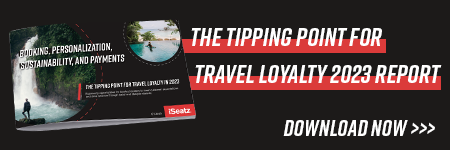This story was originally published by The Customer. Read on their site here.
Are companies focusing enough on making their travel loyalty booking processes convenient and intuitive?
Consumers in the United States are turning to their loyalty programs to find greater value in travel products. With travel demand predicted to remain strong – 55% of Americans plan to travel more in 2023 than they did in 2022 – this is a moment for loyalty providers to demonstrate their programs’ value proposition and highlight their ability to reward members the way they want to be rewarded.
But are loyalty programs making the most of this moment? If not, how can they capitalize on persistent travel demand while meeting their customers’ and members’ expectations? And what technological and strategic adjustments should they make to their loyalty initiatives to better engage with customers and maximize their revenue potential?
To answer these questions, iSeatz commissioned a survey of over 2,000 American travelers and members of loyalty programs and nearly 300 loyalty program professionals. The findings point to disparities between most loyalty programs’ offerings and what their members expect from their travel loyalty experiences. They also reveal four areas of opportunity for loyalty programs to improve their performance and better meet consumer demands: the booking experience, sustainability, personalization, and payment technology.
An appetite for quality travel rewards
The report indicates that for 43% of Americans, saving money on travel is what they value most from their loyalty programs. And yet, of the 291 companies surveyed, only 32% include travel rewards as part of their earning and redemption options, representing a missed opportunity for loyalty providers who say their top goals in 2023 are to grow membership (59%) and boost overall member engagement (59%).
But even among loyalty programs that offer travel rewards, there’s mismatch between how loyalty professionals view their programs and their members’ experiences: 63% of industry respondents say their programs are members’ first choice when booking travel, but only 51% of consumers report the same.
Focus on personalization, sustainability, and payments
With loyalty programs’ deep insight into members’ purchasing patterns and profile information, delivering personalized content can be a key part of bridging the expectations gap. Over 70% of consumers who said they receive personalized recommendations through their travel loyalty booking site say their current loyalty programs provide them with the value they are looking for, while only 44% of respondents who receive no personalized content said the same.
Another area where opinions diverge is around a program’s commitment to sustainability — a topic that is growing in importance, particularly among younger generations. While a slim majority of loyalty professionals surveyed indicate that their programs offer bonuses for booking with sustainable vendors, few provide direct sustainability reward options and even fewer plan to in the future. And with 37% of Gen Z respondents saying they would book more travel if their loyalty program had sustainability-related redemption options, incorporating these rewards appears to be a natural path to sustained program growth.
Survey data also reveals that loyalty programs and consumers aren’t entirely aligned on financial technology and payment options. While consumers are more interested in buy now, pay later tools (31%) and price/fare freezing (27%), loyalty programs who offer travel rewards are focused on more convenience-oriented payment methods such as digital wallets (offered by 66% of respondents) and account-to-account payments (59%). Introducing payment technology that consumers find most useful could be low-hanging fruit for loyalty programs hoping to grow transactions, bookings, and overall spending.
Embracing this concept of travel loyalty that puts the member experience at the center, speaks to members’ values, and expands the convenience and availability of rewards will help companies capture the attention of American travelers and ensure their future growth. Are companies devoting enough attention and resources to making their travel loyalty booking processes convenient and intuitive, offering personalized options and recommendations to members, delivering the sustainability-related options they crave, and providing the payment choices they need? If they can adjust their strategies and adapt their technologies to do so, it will help them capitalize on the resilient level of today’s travel demand and drive revenue through increased member spending through the loyalty program.
For a more in-depth look at the relationship between travel loyalty, customer perception and loyalty program performance, download the full report, Booking, Personalization, Sustainability, and Payments: The Tipping Point for Travel Loyalty in 2023 today.
Want to get more insights and updates from iSeatz? Sign up for our newsletter!

You can also learn more about iSeatz by reaching out to marketing@iseatz.com.


